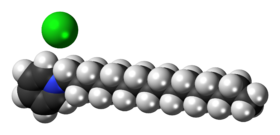西吡氯铵
化合物
西吡氯铵(cetylpyridinium chloride,CPC)是一种阳离子季铵盐化合物,属阳离子表面活性剂,全名:氯化十六烷基吡啶水合物[2](1-氯化十六烷基吡啶的一水合物[3]),主要通过降低表面张力而起到抑菌和杀菌作用,对于细菌、病毒、真菌等均有良好疗效。该化合物用于某些类型的漱口水、牙膏、润喉糖、咽喉喷雾剂、口腔喷雾剂和鼻腔喷雾剂中。
| 西吡氯铵 | |
|---|---|

| |

| |
| IUPAC名 1-Hexadecylpyridinium chloride | |
| 别名 | Acetoquat CPC; Pyrisept EXADECYL-PYRIDINIUM, CHLORIDE |
| 识别 | |
| CAS号 | 123-03-5 6004-24-6((monohydrate) D08, D09 (dressing), R02) |
| PubChem | 31239 |
| ChemSpider | 28979 |
| SMILES |
|
| InChI |
|
| InChIKey | YMKDRGPMQRFJGP-REWHXWOFAU |
| Beilstein | 3578606 |
| ChEBI | 32915 |
| 性质 | |
| 化学式 | C21H38ClN |
| 摩尔质量 | 339.99 g·mol−1 |
| 外观 | Solid |
| 熔点 | 77 °C(350 K) |
| 药理学 | |
| ATC代码 | B05CA01(B05) |
| 危险性 | |
| 致死量或浓度: | |
LD50(中位剂量)
|
36 mg/kg (rabbit, iv)[1] 400 mg/kg (rabbit, oral)[1] 6 mg/kg (rat, ip)[1] 30 mg/kg (rat, iv)[1] 200 mg/kg (rat, oral)[1] 250 mg/kg (rat, sc)[1] 10 mg/kg (mouse, ip)[1] 108 mg/kg (mouse, oral)[1] |
| 若非注明,所有数据均出自标准状态(25 ℃,100 kPa)下。 | |
西吡氯铵是一种抗菌剂,但不属于抗生素[4],可杀死细菌和其他微生物。它已证明能有效预防牙菌斑和减少牙龈炎[5][6],还可用于某些杀虫剂中[7]。
参考文献
编辑- ^ 1.0 1.1 1.2 1.3 1.4 1.5 1.6 1.7 Lewis, Richard J. Sax's Dangerous Properties of Industrial Materials 9th. New York, NY: Van Nostrand Reinhold. 1996: 691.
- ^ 赵楠, 吴桐, 王娟, 等. 西吡氯铵含片治疗口腔念珠菌病临床疗效观察 [J/CD] . 中华口腔医学研究杂志(电子版),2018,12 (3): 158-163. DOI: 10.3877/cma.j.issn.1674-1366.2018.03.004
- ^ https://www.nmpa.gov.cn/wwwroot/hy5/094.htm[失效链接]
- ^ Xu H, Zou G, Zhang X. [Clinical observation of cetylpyridinium chloride buccal tablets combined with Chinese patent medicine in the treatment of acute pharyngitis]. Lin Chuang Er Bi Yan Hou Tou Jing Wai Ke Za Zhi. 2020 Aug;34(8):755-757. Chinese. doi: 10.13201/j.issn.2096-7993.2020.08.018. PMID 32842213; PMCID: PMC10127928.
- ^ Asadoorian, Joanna; Williams, Karen. Cetylpyridinium chloride mouth rinse on gingivitis and plaque. Journal of Dental Hygiene. 2008, 82 (5).
- ^ Haps, S.; Slot, D. E.; Berchier, C. E.; Van Der Weijden, G. A. The effect of cetylpyridinium chloride-containing mouth rinses as adjuncts to toothbrushing on plaque and parameters of gingival inflammation: A systematic review. International Journal of Dental Hygiene. 2008, 6 (4): 290–303. PMID 19138180. doi:10.1111/j.1601-5037.2008.00344.x.
- ^ Rahman, B.; Alkawas, S.; Al Zubaidi, E. A.; Adel, O. I.; Hawas, N. Comparative antiplaque and antigingivitis effectiveness of tea tree oil mouthwash and a cetylpyridinium chloride mouthwash: A randomized controlled crossover study. Contemporary Clinical Dentistry. 2014, 5 (4): 466–470. PMC 4229754 . PMID 25395761. doi:10.4103/0976-237X.142813.